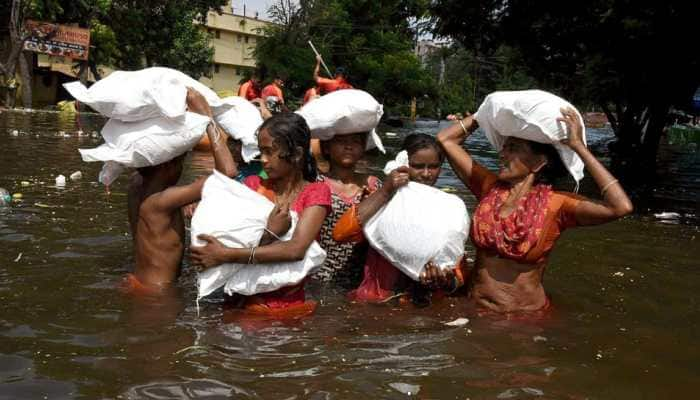Delhi's air quality improves but authorities warn pollution may increase
Delhi's air quality improved on Friday after rainfall lashed parts of the national capital, but authorities warned that pollution could increase to "dangerous levels" in the next couple of days.
Trending Photos
)
NEW DELHI: Delhi's air quality improved on Friday after rainfall lashed parts of the national capital, but authorities warned that pollution could increase to "dangerous levels" in the next couple of days.
The Supreme Court appointed Environment Protection Control Authority (EPCA) on Friday held a meeting with Punjab, Haryana and Delhi government officials to discuss the pollution situation in the national capital.
An EPCA member said the meeting took stock of the situation and it was decided that special attention would be given to vulnerable hotspots in the city where poor or very poor air quality is observed.
The overall Air Quality Index (AQI) of Delhi was recorded at 276, which falls in the poor category, according to the data from the Central Pollution Control Board.
However, data from the Centre-run System of Air Quality Forecasting and Research showed an AQI of 304, which falls in the very poor category.
An AQI between 0 and 50 is considered "good", 51 and 100 "satisfactory", 101 and 200 "moderate", 201 and 300 "poor", 301 and 400 "very poor", and 401 and 500 "severe".
On Wednesday and Thursday, the air quality had deteriorated to the very poor category, alarming authorities who were planning to roll out more stringent measures to combat pollution.
A senior official said rainfall in parts of Delhi on Thursday improved the air quality, cleansing the air of pollutants.
But he warned that the air quality would worsen in the next couple of days, especially the PM2.5 level which is expected to deteriorate to dangerous levels.
On Thursday, the PM2.5 (presence of particles in the air with a diameter of less than 2.5 micrometres) touched a new high at 158. The PM2.5, also called "fine particulates," can be a matter of more serious health concern than PM10.
While the air quality in Ghaziabad and Gurgaon continued to remain very poor category, the air quality in Noida improved to poor.
The PM10 level (presence of particles in the air with a diameter of less than 10 micrometres) in Delhi stood at 270 and the PM 2.5 level was recorded at 125, according to the data from SAFAR.
A Central Pollution Control Board official said a number of factors were responsible for the deteriorating air quality, including vehicular pollution and construction activities.
Delhi Chief Minister Arvind Kejriwal Friday warned that Delhi will become a "gas chamber soon" as the Centre, Punjab and Haryana governments did "absolutely nothing" for farmers involved in stubble burning."
"V sad that Central, Punjab and Haryana Govts did absolutely nothing for the farmers. As a result, the farmers will suffer on one hand and Delhi will become a gas chamber soon (sic)," Kejriwal tweeted.
Deputy Chief Minister Manish Sisodia Thursday appealed to the Centre and the governments of Haryana and Punjab to initiate measures in the wake of the deteriorating air quality in north India, including Delhi.
"The Centre should intervene. Farmers have not been given subsidy. This is the failure on the part of the central and the state governments. As December and January is nearing, the entire north India, including Delhi, is close to becoming a gas chamber," Sisodia had said.
He also said the AAP government had made several efforts which improved Delhi's air quality and had requested the Centre, as well as the governments of Punjab and Haryana, to take measures in this regard, but the air quality has deteriorated despite assurances.
Stay informed on all the latest news, real-time breaking news updates, and follow all the important headlines in india news and world News on Zee News.
Live Tv







)
)
)
)
)
)
)
)
)
)
